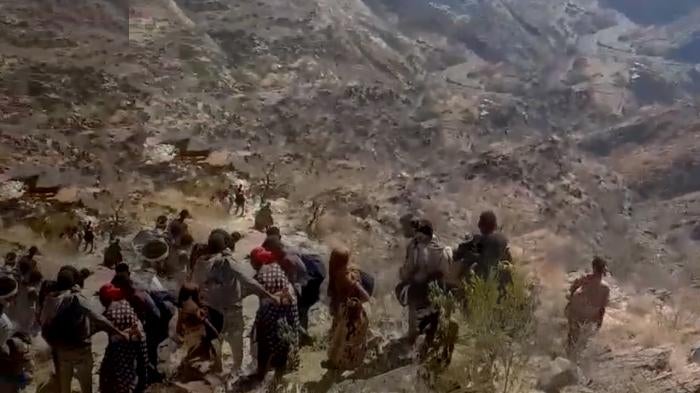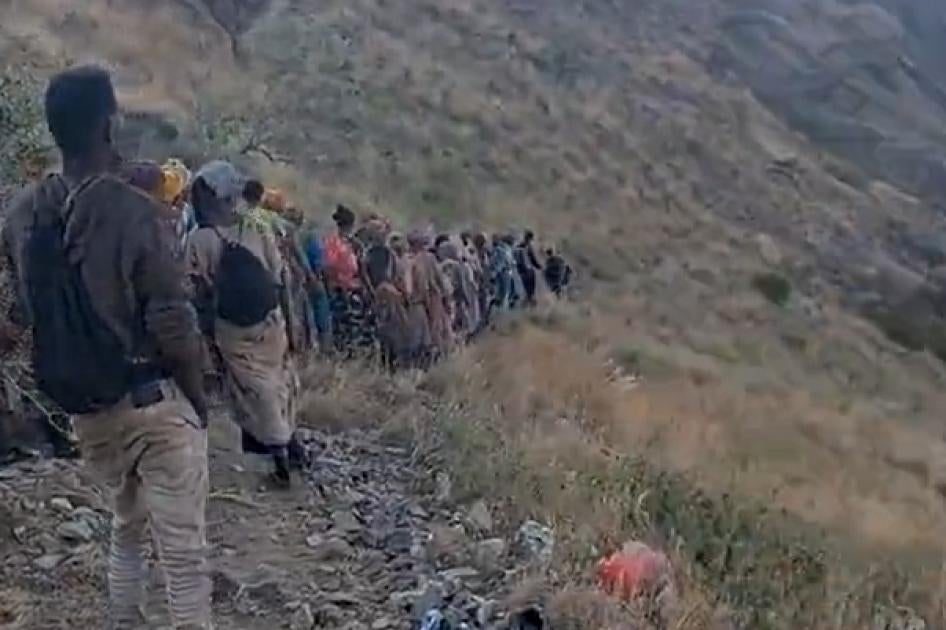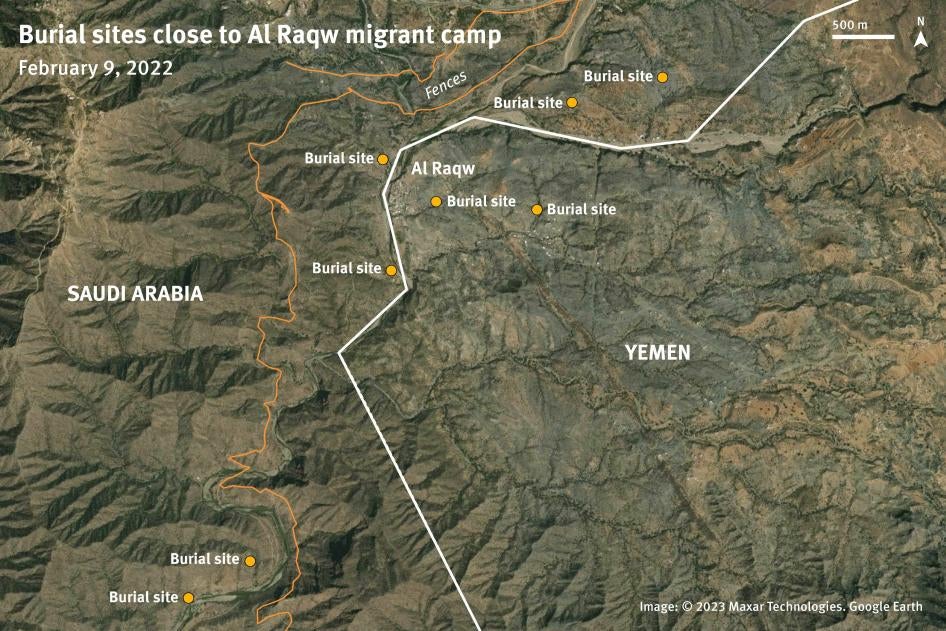- Saudi border guards have killed at least hundreds of Ethiopian migrants and asylum seekers who tried to cross the Yemen-Saudi border between March 2022 and June 2023.
- Saudi officials are killing hundreds of women and children out of view of the rest of the world while they spend billions on sports-washing to try to improve their image.
- Saudi Arabia should immediately and urgently revoke any policy to use lethal force on migrants and asylum seekers. Concerned countries should press for accountability and the UN should investigate.
(London) – Saudi border guards have killed at least hundreds of Ethiopian migrants and asylum seekers who tried to cross the Yemen-Saudi border between March 2022 and June 2023, Human Rights Watch said in a report released today. If committed as part of a Saudi government policy to murder migrants, these killings, which appear to continue, would be a crime against humanity.
The 73-page report, “‘They Fired on Us Like Rain’: Saudi Arabian Mass Killings of Ethiopian Migrants at the Yemen-Saudi Border,” found that Saudi border guards have used explosive weapons to kill many migrants and shot other migrants at close range, including many women and children, in a widespread and systematic pattern of attacks. In some instances, Saudi border guards asked migrants what limb to shoot, and then shot them at close range. Saudi border guards also fired explosive weapons at migrants who were attempting to flee back to Yemen.
“Saudi officials are killing hundreds of migrants and asylum seekers in this remote border area out of view of the rest of the world,” said Nadia Hardman, refugee and migrant rights researcher at Human Rights Watch. “Spending billions buying up professional golf, football clubs, and major entertainment events to improve the Saudi image should not deflect attention from these horrendous crimes.”
Human Rights Watch interviewed 42 people, including 38 Ethiopian migrants and asylum seekers who tried to cross the Yemen-Saudi border between March 2022 and June 2023, and 4 relatives or friends of those who tried to cross during that period. Human Rights Watch analyzed over 350 videos and photographs posted to social media or gathered from other sources, and several hundred square kilometers of satellite imagery.
Human Rights Watch wrote to the Saudi and Houthi authorities. The Houthi authorities replied to our letter on August 19, 2023.
Approximately 750,000 Ethiopians live and work in Saudi Arabia. While many migrate for economic reasons, a number have fled because of serious human rights abuses in Ethiopia, including during the recent, brutal armed conflict in the north.
While Human Rights Watch has documented killings of migrants at the border with Yemen and Saudi Arabia since 2014, the killings appear to be a deliberate escalation in both the number and manner of targeted killings.
Migrants and asylum seekers said they crossed the Gulf of Aden in unseaworthy vessels, Yemeni smugglers then took them to Saada governorate, currently under the control of the Houthi armed group, on the Saudi border.
Many said Houthi forces worked with smugglers and would extort them or transfer them to what migrants described as detention centers, where people were abused until they could pay an “exit fee.”
Migrants in groups of up to 200 people would regularly try to cross the border into Saudi Arabia, often making multiple attempts after Saudi border guards pushed them back. Migrants said that their groups had more women than men and unaccompanied children. Human Rights Watch has identified Saudi border guard posts from satellite images that are consistent with these accounts. Human Rights Watch also identified what appears to be a Mine-Resistant Ambush Protected vehicle positioned from October 10, 2021, to December 31, 2022, at one of the Saudi border guard posts. The vehicle appeared to have a heavy machine gun mounted in a turret on its roof.
People traveling in groups described being attacked by mortar projectiles and other explosive weapons from the direction of Saudi border guards once they had crossed the border. Those interviewed described 28 incidents with Saudi border guards using explosive weapons. Survivors said the Saudis sometimes held them in detention facilities, in some cases for months.
All described scenes of horror: women, men, and children’s bodies strewn across the mountainous landscape severely injured, already dead and dismembered. “First I was eating with people and then they were dying,” said one person. “There are some people who you cannot identify because their bodies are thrown everywhere. Some people were torn in half.”
A Human Rights Watch digital investigation of videos posted to social media or sent directly to Human Rights Watch and verified and geolocated show dead and wounded migrants on the trails, in camps, and in medical facilities. Geospatial analysis revealed growing burial sites near the migrant camps and expanding border security infrastructure.
Members of the Independent Forensic Expert Group of the International Rehabilitation Council for Torture Victims, an international group of prominent forensic experts, analyzed verified videos and photographs showing injured or dead migrants to determine the causes of their wounds. They concluded that some injuries exhibited “clear patterns consistent with the explosion of munitions with capacity to produce heat and fragmentation,” while others have “characteristics consistent with gunshot wounds” and, in one instance, “burns are visible.”
People traveling in smaller groups or on their own said once they crossed the Yemen-Saudi border that Saudi border guards carrying rifles shot at them. People also described guards beating them with rocks and metal bars. Fourteen interviewees witnessed or were themselves wounded in shooting incidents at close range. Six were targeted both by explosive weapons and by shootings.
Some said Saudi border guards would descend from their border guard posts and beat survivors. A 17-year-old boy said border guards forced him and other survivors to rape two girl survivors after the guards had executed another migrant who refused to rape another survivor.
Saudi Arabia should immediately and urgently revoke any policy, whether explicit or de facto, to use lethal force on migrants and asylum seekers, including targeting them with explosive weapons and close-range shootings. The government should investigate and appropriately discipline or prosecute security personnel responsible for unlawful killings, wounding, and torture at the Yemen border.
Concerned governments should publicly call for Saudi Arabia to end any such policy and press for accountability. In the interim, concerned governments should impose sanctions on Saudi and Houthi officials credibly implicated in ongoing violations at the border.
A UN-backed investigation should be established to assess abuses against migrants and whether killings amount to crimes against humanity.
“Saudi border guards knew or should have known they were firing on unarmed civilians,” Hardman said. “If there is no justice for what appear to be serious crimes against Ethiopian migrants and asylum seekers, it will only fuel further killings and abuses.”










